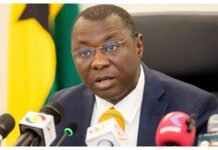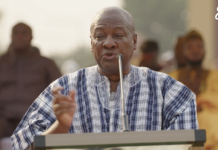
Experts have bemoaned the alarming rate of “unplanned spending” on the part of government, arguing the trend is contributing immensely to “fiscal indiscipline.”
Speaking at a national dialogue on sustainable funding of the “Free SHS” policy in Accra, Mr. Samuel Bekoe of the Ghana Oil and Gas for Inclusive Growth (GOGIG) cautioned government to pull brakes on the development to put the economy back on track.
He revealed that in 2016 government’s unplanned spending totaled Gh¢5 billion.
“We overspend in this country. We spend more than we receive, especially in election years… there is persistent unplanned spending in our budget and it keeps increasing.This could derail the economy,” Bekoe warned.
According to him, factors that contribute to overspending or fiscal indiscipline comprise excessive recurred expenditure, persistent borrowing which leads to increase in interest rate as well as budget arrears.
“This trend is not healthy for our economy. We are always borrowing or spending what we don’t have and keep on spending,” Bekoe lamented.
He suggested to government to adopt the Chile strategy where there is “clear expenditure room to guide” the government in planning for the future.
He stated: “Chile is one of the countries with the best practices in fiscal management and we can learn a lot from them because in Ghana we don’t have planned expenditure path. We just follow or spend whatever comes our way.”

In order to arrest the disturbing issue of “unplanned spending” in Ghana, Mr. Bekoe suggested the “need to build consensus between managerial, political and macroeconomic actors as well as have a strategic spending rule.”
“We also need applicable international best practice and expenditure policy rule. We must also prioritise our expenditure and timing as well as adopt fiscal responsibility law and I must commend the government for serving notice of going along that line,” he added.
“We also need proper monitoring and evaluation of spending to ensure that infractions have been reduced.”
The dialogue was organised by the Public Interest and Accountability Committee (PIAC) in collaboration with the Natural Resource Governance Institute (NRGI) and Starr FM.
The dialogue was convened with the following outcome objectives:
– Discuss sustainable options for funding the ‘Free SHS’ outlining the potential contribution from petroleum revenues.
– Advocate for additional information on an implementation and costing strategy which states the government’s plan for rolling out the ‘Free SHS’ policy and manage the public’s expectations.
– Discuss the current financing options for secondary education and highlight the potential impacts of this new policy on existing educational infrastructure, enrolment rates, and the quality of teaching and learning.
– Draft a policy paper at the end of the discussions to be shared with key stakeholders explaining in detail potential funding options as well as risks and opportunities that each funding option presents.
– Generate broader conversation around the sustainable use of petroleum revenues.




